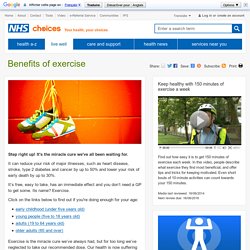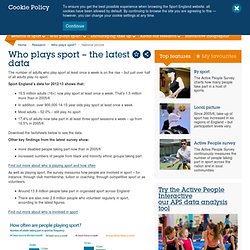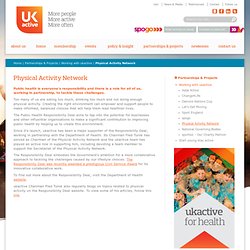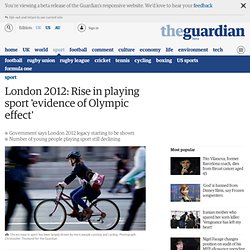

Who plays sport and how. Benefits of exercise - Live Well. Step right up!

It's the miracle cure we've all been waiting for. It can reduce your risk of major illnesses, such as heart disease, stroke, type 2 diabetes and cancer by up to 50% and lower your risk of early death by up to 30%. It’s free, easy to take, has an immediate effect and you don’t need a GP to get some. Its name? Exercise. Click on the links below to find out if you're doing enough for your age: Exercise is the miracle cure we’ve always had, but for too long we’ve neglected to take our recommended dose. This is no snake oil. People who do regular activity have a lower risk of many chronic diseases, such as heart disease, type 2 diabetes, stroke, and some cancers.
Research shows that physical activity can also boost self-esteem, mood, sleep quality and energy, as well as reducing your risk of stress, depression, dementia and Alzheimer’s disease. Health benefits Given the overwhelming evidence, it seems obvious that we should all be physically active. What counts? A modern problem. 1x30_overall_factsheet_APS7_final. National picture. The number of adults who play sport at least once a week is on the rise – but just over half of all adults play no sport.

Sport England’s data for 2012/13 shows that: 15.5 million adults (16+) now play sport at least once a week. That’s 1.5 million more than in 2005/6In addition, over 900,000 14-15 year olds play sport at least once a weekMost adults – 52.0% – still play no sport17.4% of adults now take part in at least three sport sessions a week – up from 15.5% in 2005/6 Download the factsheets below to see the data. Other key findings from the latest survey show: Physical Activity Network. Public health is everyone's responsibility and there is a role for all of us, working in partnership, to tackle these challenges.

Too many of us are eating too much, drinking too much and not doing enough physical activity. Creating the right environment can empower and support people to make informed, balanced choices that will help them lead healthier lives. The Public Health Responsibility Deal aims to tap into the potential for businesses and other influential organisations to make a significant contribution to improving public health by helping us to create this environment. Since it's launch, ukactive has been a major supporter of the Responsibility Deal, working in partnership with the Department of Health. Its Chairman Fred Turok has served as Chairman of the Physical Activity Network and the ukactive team has played an active role in supporting him, including devoting a team member to support the Secretariat of the Physical Activity Network. London Olympics sees surge in men and women playing sport on a weekly basis – Mail Online.
London Olympics sees surge in men and women playing sport on a weekly basis – Mail Online This is an article from the Mail about how more people are getting involved in sporting activity as a consequence of the London Olympics.

The article states that according to figured made by Sports England, the Olympic and Paralympic games has led to breaking record numbers of women and men taking part in sport weekly and this includes an increase of ’200,000 people who are cycling once a week compared to October 2011, bringing the total number of people in England now cycling at least once per week to just under two million.’ According to the Active People Survey, in 2012 15.5million people are playing sport each week with an increase of 1.57million from when London was announced as the city to host the 2005 Olympic games.
The article also states that the largest increase of sport has been among as many as 500,000 women. Like this: Like Loading... London Olympics sees surge in men and women playing sport on a weekly basis. By Andrew Gwilym, Press Association Published: 14:42 GMT, 6 December 2012 | Updated: 14:42 GMT, 6 December 2012 The impact of London’s staging of the Olympic and Paralympic Games has led to record numbers of men and women playing sport every week, according to figures released by Sport England.

The Active People Survey results covering the year to October 2012 show that 15.5million people aged 16 and over are playing sport each week, a rise of 750,000 compared to a year ago and an increase of 1.57million from when London won the right to host the Games in 2005. The largest increase has been among women, with 500,000 taking part in sports such as cycling, netball, running, swimming and going to the gym. London 2012: Rise in playing sport 'evidence of Olympic effect'
The government has claimed that a rise in the number of people playing sport once a week is evidence that the promised sporting legacy from the London 2012 Games is starting to bear fruit, although the number of young people participating continues to decline.

Trends in Leisure Activities 2012. Trends in Leisure Activities - 2012 - Executive Summary. Screen Shot 2014-01-28 at 11.42.52. Health Clubs & Leisure Centres 2013. Health Clubs & Leisure Centres. Sky Ride drives growth in women cycling. Is the bike trade placing enough emphasis on non-sporty cycling in its product ranges?

BikeBiz Award-winning Sky Ride is playing a leading role in British Cycling's strategy to get more women on bikes, which has announced it is on track to get one million more women cycling over the next seven years. According to the organisation, over a third of the 100,000 women engaged in the project so far have been via Sky Ride, the free guided bike rides taking place around the country, including large-scale traffic-free rides in cities like London, Birmingham and Manchester.
On the racing/challenge side of cycling, 24,000 women have taken part in British Cycling sportives so far in 2013. Female member base of British Cycling has jumped 19 per cent since the strategy was announced. Based on those numbers, is the bike trade over playing the sporty side of the women's market? Article continues below.